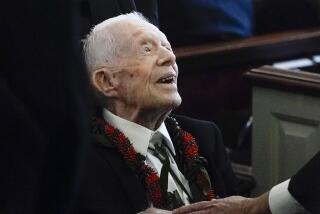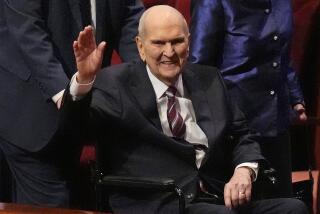Oldest American Recalls Centennial
- Share via
LANDSDALE, Pa. — Florence Knapp’s earliest memory is of traveling with her parents to an exhibition in Philadelphia when she was 3 years old.
Nothing unusual about that, except that the year was 1876, and the event was the American Centennial.
The Civil War had ended just 11 years earlier. The president was Ulysses S. Grant. And the nation was still reeling from news of a massacre of federal troops at a place called Little Big Horn.
To Knapp, who at 113 is listed by Guinness Superlatives Ltd. as the oldest person in America and the second-oldest person in the world, it doesn’t seem so long ago.
“Things haven’t changed. I don’t think the world has changed much at all,” the tiny, wispy-haired woman said recently from her recliner at the Dock Terrace Nursing Home in Towamencin Township, Pa.
Memory Is Still Sharp
The fact that Knapp is a living emissary from the Grant era makes her something of a historical figure in her own right. And although her hearing and eyesight have grown dim, her mind and her memory still sparkle.
“Oh, yes. I remember marching down Broad Street in Philadelphia for women’s suffrage” in 1919, said the former grammar school teacher who has been a lifelong advocate of women’s rights.
“Everybody had to wear a white dress and white shoes and stockings. I was to carry a banner. It said, ‘Votes for Women,’ ” she recalled, speaking in a slow, clear voice and fingering a corsage on her white cardigan.
“I remember a big wind came up and blew the banner right up in the air,” she said. “I was off my feet, about four feet in the air, hanging onto the banner.”
Change Came Slowly
Knapp said she and her comrades achieved their goal only to find that, as with most revolutions, real change was slow in coming.
“After women got the vote, everything was going to be hunky-dory. Everything would be wonderful,” she said. “But after we got the vote, the bad things went on, and the good things went on. And sometimes the bad things were badder.”
As for the Centennial, Knapp remembers it mainly as a “big fair” with “lots of people,” but she was too young at the time to retain much else about it except that her parents bought her a walking stick and a medicine bottle as souvenirs, which she has saved to this day.
Knapp’s perspective on the world has always been from the corner of southeastern Pennsylvania where she grew up. Until she moved to the nursing home a few years ago, she lived all her life in the stone farmhouse in Montgomery Square that she was born in on Oct. 10, 1873.
The date is recorded in an affidavit signed by a relative who assisted in the delivery.
More to Read
Sign up for Essential California
The most important California stories and recommendations in your inbox every morning.
You may occasionally receive promotional content from the Los Angeles Times.













